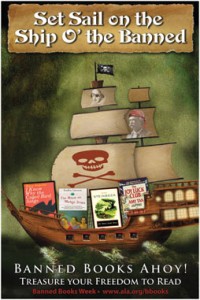By Sara Pintilie/entertainment editor
 What do Where’s Waldo?, To Kill a Mockingbird and The Giver have in common?
What do Where’s Waldo?, To Kill a Mockingbird and The Giver have in common?
The books have all been banned.
The 26th annual Banned Book Week, Sept. 29-Oct. 6, brings awareness to censorship in literature.
Started in 1982 by the American Library Association, this week showcases books frequently challenged or banned from public libraries and schools
“ We want to draw attention to the fact,” Deborah Caldwell-Stone, deputy director of the Office for Intellectual Freedom, a department of the ALA, said.
“ There are those who would remove books because they disapprove of the political ideas or religious ideas or just the plain content of those books.”
In 2006, 546 challenges were reported, and And Tango Makes Three by Justin Richardson topped the list.
“ Of course, there are challenges that are never reported to us,” Caldwell-Stone said. “And from our sampling, we make an educated guess that’s only about 20-25 percent of the actual challenges that take place in our country.”
Books are challenged or banned for various reasons, such as sexual content, occultism and language.
But some books are challenged for more unorthodox reasons.
For example, in Wisconsin in 1985, Shel Silverstein’s A Light in the Attic was challenged because it “encouraged children to break dishes so they won’t have to dry them.”
“ What you choose to censor might not be what I choose to censor,” Janet Key, SE director of library services, said.
What is the difference between a challenge and a ban?
A challenge is an attempt to remove or restrict materials, based upon the objections of a person or group, ALA’s Web site states. A banning is the removal of those materials.
“ Censorship in literature denies a person the right to make up their own mind,” Anna Holzer, director of NW library services, said, “and form their own opinion about a book, magazine, etc.”
This year all four campus libraries will have a display celebrating Banned Book Week.
The displays will feature a selection of challenged and banned books and ways to find more information on censorship in literature.
“ [ALA’s Web site] has a good amount about the week and the need to recognize banned and challenged books,” Key said.
The ALA Web site, www.ala.org/bbooks, contains information on the banned literature and ways students can bring awareness to the issue.
The Web site also showcases notable first Amendment cases. One of the most recent is 2003’s Counts v. Cedarville School District.
In Cedarville, Ark., the school board restricted students’ access to the Harry Potter series because the novels promoted occult themes and disobedience toward adults.
Students were required to have a signed permission slip to obtain the popular series.
According to the Banned Book Resource Guide, a fourth grader filed a federal lawsuit to overturn the school board decision.
The district court ruled in the student’s favor.
“ [Students] need to have open viewpoints about different ideas,” Key said.
Along with their community, students can do various things to celebrate Banned Book Week.
“ Proclaim a Banned Books Week at their library,” Kelly Clute, NW library assistant, said. “Put a Banned Books Week sticker on the bumper of their vehicle. Wear a T-shirt with an anti-censorship message.”
Also celebrating the annual event is the bookstore chain Half Price Books. It has its own anti-censorship Web site at www.deletecensorship.org.
Voltaire, a frequently challenged author of Candide, once said, “I disapprove of what you say, but I will defend to the death your right to say it. ”
Most Challenged Books of the 21st Century (2000-2005)
Harry Potter series by J.K. Rowling
The Chocolate War by Robert Cormier
Alice series by Phyllis Reynolds Naylor
Of Mice and Men by John Steinbeck
I Know Why the Caged Bird Sings by Maya Angelou
Fallen Angels by Walter Dean Myers
It’s Perfectly Normal by Robie Harris
Scary Stories series by Alvin Schwartz
Captain Underpants series by Dav Pilkey
Forever by Judy Blume
Most Challenged Books of 2006
And Tango Makes Three by Justin Richardson and Peter Parnell
Gossip Girls series by Cecily Von Ziegesar
Alice by Phyllis Reynolds Naylor
The Earth, My Butt, and Other Round Things by Carolyn Mackler
The Bluest Eye by Toni Morrison
Scary Stories series by Alvin Schwartz
Athletic Shorts by Chris Crutcher
The Perks of Being a Wallflower by Stephen Chbosky
Beloved by Toni Morrison
The Chocolate War by Robert Cormier
































